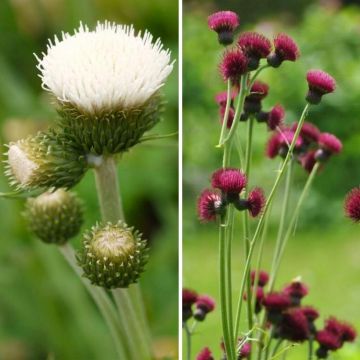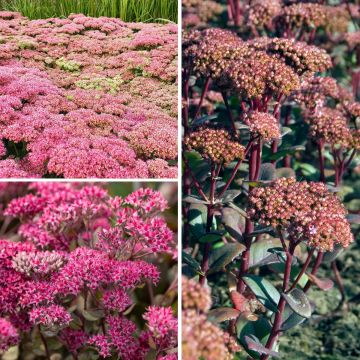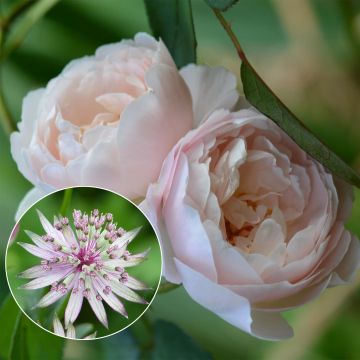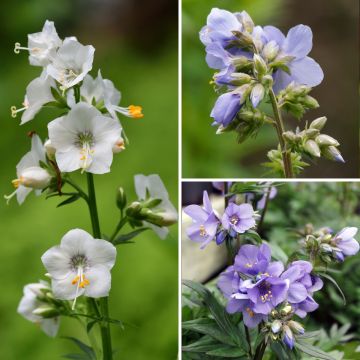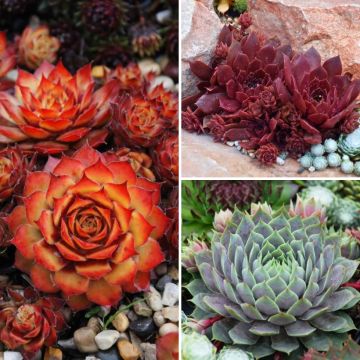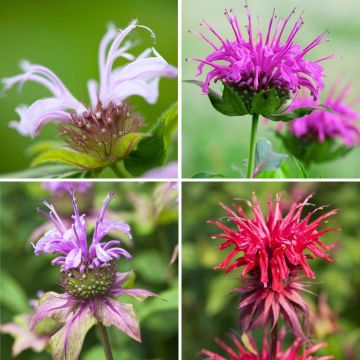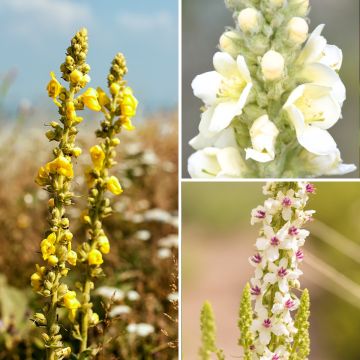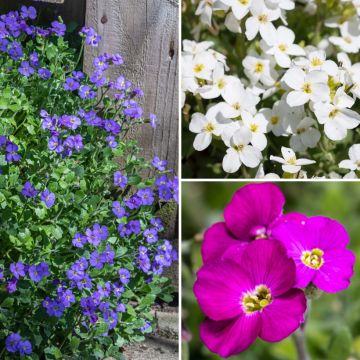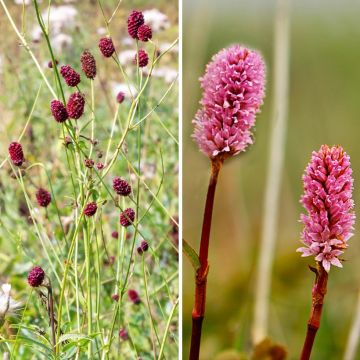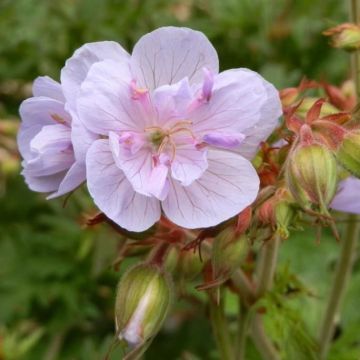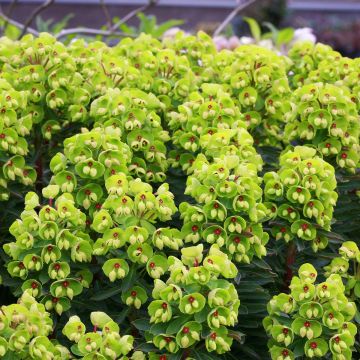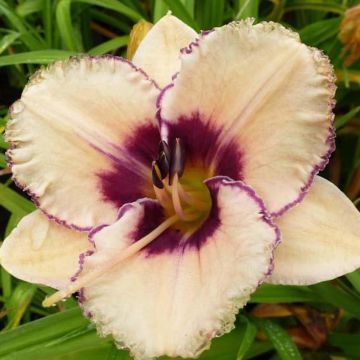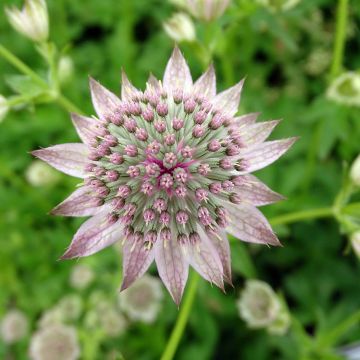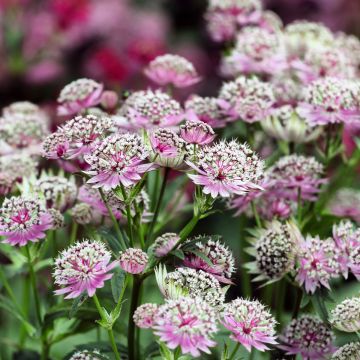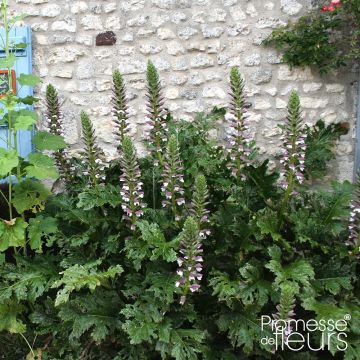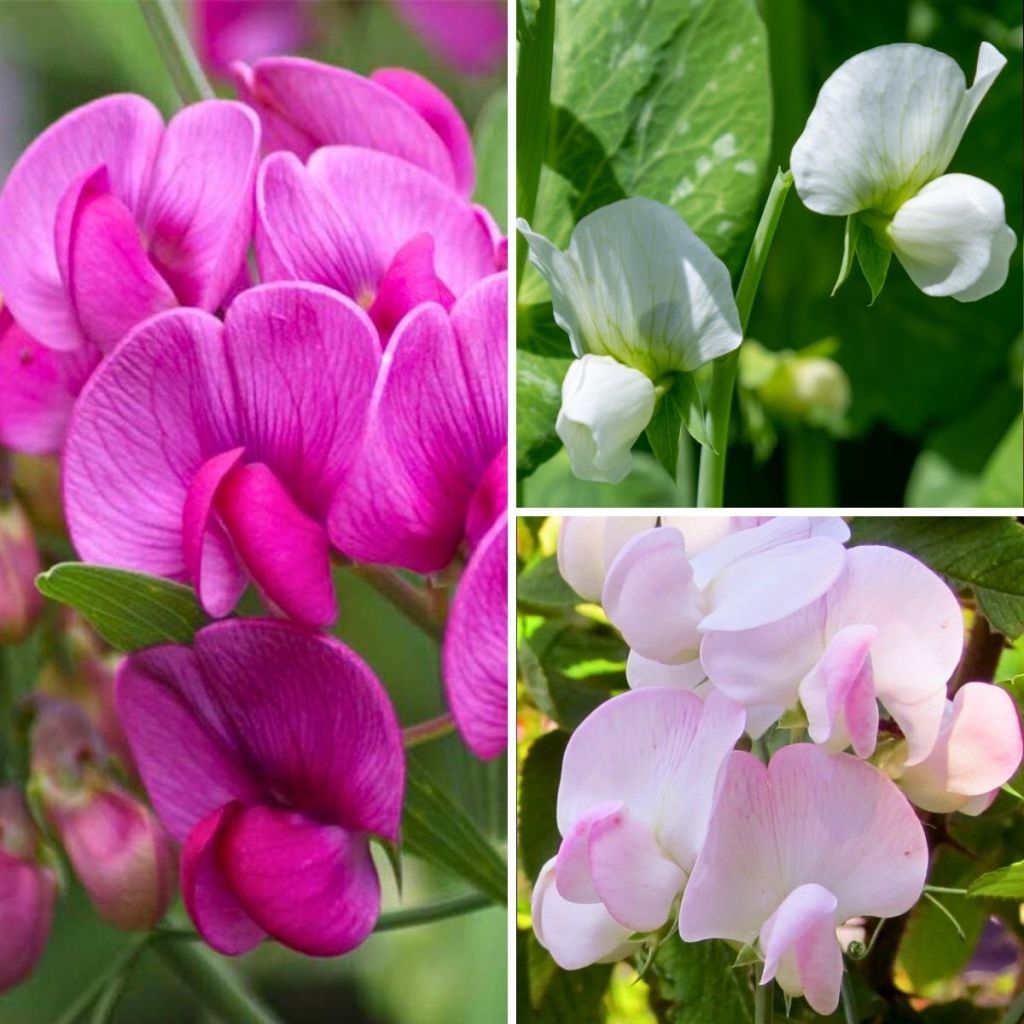

Perennial Peavine Collection
Perennial Peavine Collection
Lathyrus latifolius Pink Pearl, Red Pearl, White Pearl
Perennial Peavine, Broad-leaved everlasting-pea
This plant carries a 12 months recovery warranty
More information
We guarantee the quality of our plants for a full growing cycle, and will replace at our expense any plant that fails to recover under normal climatic and planting conditions.
From €5.90 for pickup delivery and €6.90 for home delivery
Express home delivery from €8.90.
Does this plant fit my garden?
Set up your Plantfit profile →
Collection items (3 plants)
Description
The collection consists of 3 plants:
- 1 x perennial sweet pea Lathyrus latifolius 'Pink Pearl' with pale pink flowers
- 1 x perennial sweet pea Lathyrus latifolius 'Red Peal' with deep, vibrant carmine pink flowers
- 1 x perennial sweet pea Lathyrus latifolius 'White Peal' with ivory white flowers with splashes of very pale yellow-green.
The Chinese sweet peas in this collection are interesting for their long spring to summer flowering and their low maintenance requirements. Place them in the sun, provide a support like a fence or trellis for them to cling to, or let them climb up nearby bushes. Growing from a large fleshy root, their flattened stems with tendrils can reach a length of 1.80 m (6ft) within a season. They tolerate limestone, any well-prepared and well-drained garden soil will suit them. The roots of Lathyrus latifolius can eventually occupy about 50-60 cm² of ground: take this into account when planting! If its foliage dries out during a dry summer, it will reappear with the first rains. If it thrives, this sweet pea can become invasive by self-seeding abundantly! Regularly removing forming pods will prolong flowering while preventing spontaneous self-seeding.
Let the perennial sweet peas in this collection climb in shrub roses, buddleias, and mock oranges, for example. As cut flowers, the clusters remain beautiful for several days and pair well with peonies, garden irises, and lilac branches.
Report an error about the product description
Flowering
Foliage
Plant habit
Botanical data
Lathyrus
latifolius
Pink Pearl, Red Pearl, White Pearl
Fabaceae
Perennial Peavine, Broad-leaved everlasting-pea
China
Other Perennial collections
Planting and care
Plant your sweet peas in early spring (early autumn in southern regions) in full sun or light shade, in ordinary soil, preferably calcareous and well-drained, but they can grow in any good garden soil. Regular, but not excessive watering will accelerate its growth. A sunny location, a supply of fertiliser for flowering plants, and the removal of faded flowers will promote abundant flowering from June to September and limit seed formation. Once well rooted, this plant can do without watering in summer: in the event of a very dry summer, its foliage will dry out and it with go into dormancy until the rain returns. In Mediterranean areas, flowering occurs earlier, but is stopped by the arrival of heat and drought.
Planting period
Intended location
Care
This item has not been reviewed yet - be the first to leave a review about it.
Summer flowering perennials
Haven't found what you were looking for?
Hardiness is the lowest winter temperature a plant can endure without suffering serious damage or even dying. However, hardiness is affected by location (a sheltered area, such as a patio), protection (winter cover) and soil type (hardiness is improved by well-drained soil).

Photo Sharing Terms & Conditions
In order to encourage gardeners to interact and share their experiences, Promesse de fleurs offers various media enabling content to be uploaded onto its Site - in particular via the ‘Photo sharing’ module.
The User agrees to refrain from:
- Posting any content that is illegal, prejudicial, insulting, racist, inciteful to hatred, revisionist, contrary to public decency, that infringes on privacy or on the privacy rights of third parties, in particular the publicity rights of persons and goods, intellectual property rights, or the right to privacy.
- Submitting content on behalf of a third party;
- Impersonate the identity of a third party and/or publish any personal information about a third party;
In general, the User undertakes to refrain from any unethical behaviour.
All Content (in particular text, comments, files, images, photos, videos, creative works, etc.), which may be subject to property or intellectual property rights, image or other private rights, shall remain the property of the User, subject to the limited rights granted by the terms of the licence granted by Promesse de fleurs as stated below. Users are at liberty to publish or not to publish such Content on the Site, notably via the ‘Photo Sharing’ facility, and accept that this Content shall be made public and freely accessible, notably on the Internet.
Users further acknowledge, undertake to have ,and guarantee that they hold all necessary rights and permissions to publish such material on the Site, in particular with regard to the legislation in force pertaining to any privacy, property, intellectual property, image, or contractual rights, or rights of any other nature. By publishing such Content on the Site, Users acknowledge accepting full liability as publishers of the Content within the meaning of the law, and grant Promesse de fleurs, free of charge, an inclusive, worldwide licence for the said Content for the entire duration of its publication, including all reproduction, representation, up/downloading, displaying, performing, transmission, and storage rights.
Users also grant permission for their name to be linked to the Content and accept that this link may not always be made available.
By engaging in posting material, Users consent to their Content becoming automatically accessible on the Internet, in particular on other sites and/or blogs and/or web pages of the Promesse de fleurs site, including in particular social pages and the Promesse de fleurs catalogue.
Users may secure the removal of entrusted content free of charge by issuing a simple request via our contact form.
The flowering period indicated on our website applies to countries and regions located in USDA zone 8 (France, the United Kingdom, Ireland, the Netherlands, etc.)
It will vary according to where you live:
- In zones 9 to 10 (Italy, Spain, Greece, etc.), flowering will occur about 2 to 4 weeks earlier.
- In zones 6 to 7 (Germany, Poland, Slovenia, and lower mountainous regions), flowering will be delayed by 2 to 3 weeks.
- In zone 5 (Central Europe, Scandinavia), blooming will be delayed by 3 to 5 weeks.
In temperate climates, pruning of spring-flowering shrubs (forsythia, spireas, etc.) should be done just after flowering.
Pruning of summer-flowering shrubs (Indian Lilac, Perovskia, etc.) can be done in winter or spring.
In cold regions as well as with frost-sensitive plants, avoid pruning too early when severe frosts may still occur.
The planting period indicated on our website applies to countries and regions located in USDA zone 8 (France, United Kingdom, Ireland, Netherlands).
It will vary according to where you live:
- In Mediterranean zones (Marseille, Madrid, Milan, etc.), autumn and winter are the best planting periods.
- In continental zones (Strasbourg, Munich, Vienna, etc.), delay planting by 2 to 3 weeks in spring and bring it forward by 2 to 4 weeks in autumn.
- In mountainous regions (the Alps, Pyrenees, Carpathians, etc.), it is best to plant in late spring (May-June) or late summer (August-September).
The harvesting period indicated on our website applies to countries and regions in USDA zone 8 (France, England, Ireland, the Netherlands).
In colder areas (Scandinavia, Poland, Austria...) fruit and vegetable harvests are likely to be delayed by 3-4 weeks.
In warmer areas (Italy, Spain, Greece, etc.), harvesting will probably take place earlier, depending on weather conditions.
The sowing periods indicated on our website apply to countries and regions within USDA Zone 8 (France, UK, Ireland, Netherlands).
In colder areas (Scandinavia, Poland, Austria...), delay any outdoor sowing by 3-4 weeks, or sow under glass.
In warmer climes (Italy, Spain, Greece, etc.), bring outdoor sowing forward by a few weeks.




































